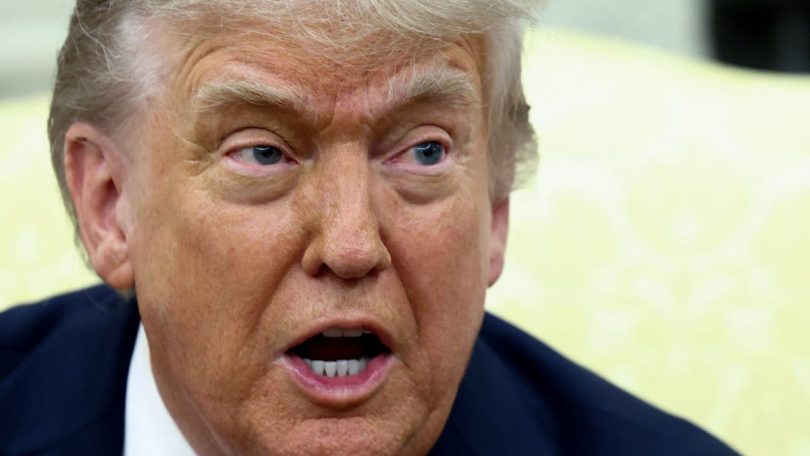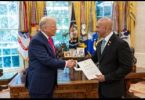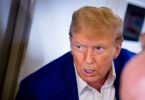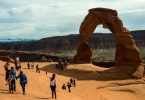South Florida’s airports are common gateways for people from Haiti, Venezuela and Cuba to enter the U.S. Each nation has a presence in South Florida.
Palm Beach Sheriff Bradshaw says no to mass immigration raids
Palm Beach County Sheriff Ric Bradshaw tried to reassure Hispanic leaders that people can live without fear of arrest. Doubts lingered.
- President Trump announced a travel ban affecting 12 countries, including Haiti, and visa restrictions on 7 others, including Cuba and Venezuela.
- Florida is expected to be significantly impacted due to the large populations from these nations residing in the state.
- The ban halts all travel from listed countries and restricts visas for others, impacting student, business, and tourism travel.
- Trump cited national security concerns and “deficient” vetting processes as justification for the ban.
- Exceptions exist for permanent residents, athletes, and individuals of national interest.
(This story was updated to add new information.)
Few places are expected to bear the brunt of the travel restrictions President Trump announced June 4 more than Florida, with Haiti, Venezuela and Cuba among the affected nations.
His administration banned travel from 12 countries including Haiti and placed visa restrictions on seven other nations including Cuba and Venezuela. Many people traveling to the U.S. from these nations arrive at airports in South Florida and have made their homes in Palm Beach, Broward and Miami-Dade counties.
All three nations are also coping with two other major Supreme Court rulings allowing Trump to proceed with deportations, at least for now. One allowed the Department of Homeland Security to end Temporary Protected Status for 350,000 Venezuelans at risk of being forced out of the U.S. Another wave of 250,000 Venezuelans may lose their status later this year, along with groups of 500,000 Haitians and some Cubans.
The other allows the administration to end humanitarian parole, which affects all three nations as well, with Haiti, torn by years of economic problems and political turmoil, chief among them.
The travel ban, which goes into effect on June 9, halts all travel to the U.S. by citizens of Haiti, Afghanistan Myanmar, the Republic of Congo, Equatorial Guinea, Eritrea, Iran, Libya, Somalia, Sudan and Yemen.
Trump’s order also restricted travel from Cuba, Venezuela, Burundi, Laos, Sierra Leone, Togo and Turkmenistan. Citizens from those countries are barred from coming to the U.S. permanently or receiving student, business and tourism visas.
The travel ban revived similar policies form Trump’s first administration known as “the Muslim ban” enacted to prevent immigrants from certain countries from entering the U.S.
The Florida Immigration Coalition opposed both measures and took special exception to the inclusion of Haiti, with so many people seeking refuge from the poverty and gang violence that have marked the Caribbean nation’s life for decades.
“The inclusion of Haiti under a vague and unsubstantiated rationale is particularly troublesome for Floridians, whose lives are touched by thousands of our neighbors who still have family members in Haiti struggling to survive,” it said in a prepared statement.
Why did Trump enact a travel ban?
Trump said in a video the order grew from the Egyptian man in Colorado who attacked a group rallying for Israeli hostages held in Gaza. Egypt, however, was not on the list of countries in the new travel ban.
Saying it acted to ensure national security, the White House said the travel ban comes after the Secretary of State Marco Rubio determined the 19 countries had “deficient” vetting and screening information and their immigrants frequently overstay their visas.
“We don’t want them,” Trump said in a video announcing the bans.
The order also cited the countries had taken advantage of the U.S by the “exploitation of our visa system” and their failure to accept back their deported citizens.
U.S. Rep. Maxwell Frost, D-Orlando, called the ban cruel and inhumane. He said it made him question whether Trump’s administration has a plan for immigration beyond using it as “a political weapon to instill fear and distract the American people.”
“It does nothing to make our communities safer, but it does vilify immigrants,” Frost’s statement said.
For Haiti, the White House said the Caribbean nation had a business and tourist visa overstay rate of 31% and other student visas of 25%. It alleged hundreds of thousands of Haitians came to the U.S. during the term of President Joe Biden, Trump’s predecessor who defeated him in the 2020 election.
What are the new visa restrictions affecting Cuba and Venezuela?
Trumps travel ban suspended the entrance of Cuban and Venezuelan nationals with the following visas: B-1, B 2, B-1/B-2, F, M and J.
The B-1 visas are granted for business and B-2 for tourism. F visas are for international students, M visas are for people participating in cultural exchanges and those for academic research are type J.
For Cuba, the White House said the Cuban government does not share sufficient law-enforcement information with the U.S., and has historically refused to accept back its removable nationals. Cuba had a business and tourist visa overstay rate of 8% and other student visas of 19%, Trump officials said.
The order labels Cuba “a state sponsor of terrorism.”
For Venezuela, the Trump administration cited the country lacks a competent or cooperative central authority for issuing passports or civil documents and it does not have appropriate screening and vetting measures. Venezuela has historically refused to accept back its nationals.
Venezuela had a B 1/B-2 visa overstay rate of 10% percent, according to the Overstay Report.
What are the exceptions to Trump’s travel ban?
The White House’s order also details what nationals from the 19 countries will be able to keep traveling to the U.S.
- All permanent U.S. residents.
- Afghan citizens that have migrant visas.
- Athletes coming to compete in U.S. sports events, such as the soccer World Cup in 2026 and the Olympics of 2028.
- Exceptions could also be granted on a case-by-case basis if the person is of national interest to the U.S.
Valentina Palm covers Royal Palm Beach, Wellington, Greenacres, Palm Springs and other western communities in Palm Beach County for The Palm Beach Post. Email her at [email protected].










